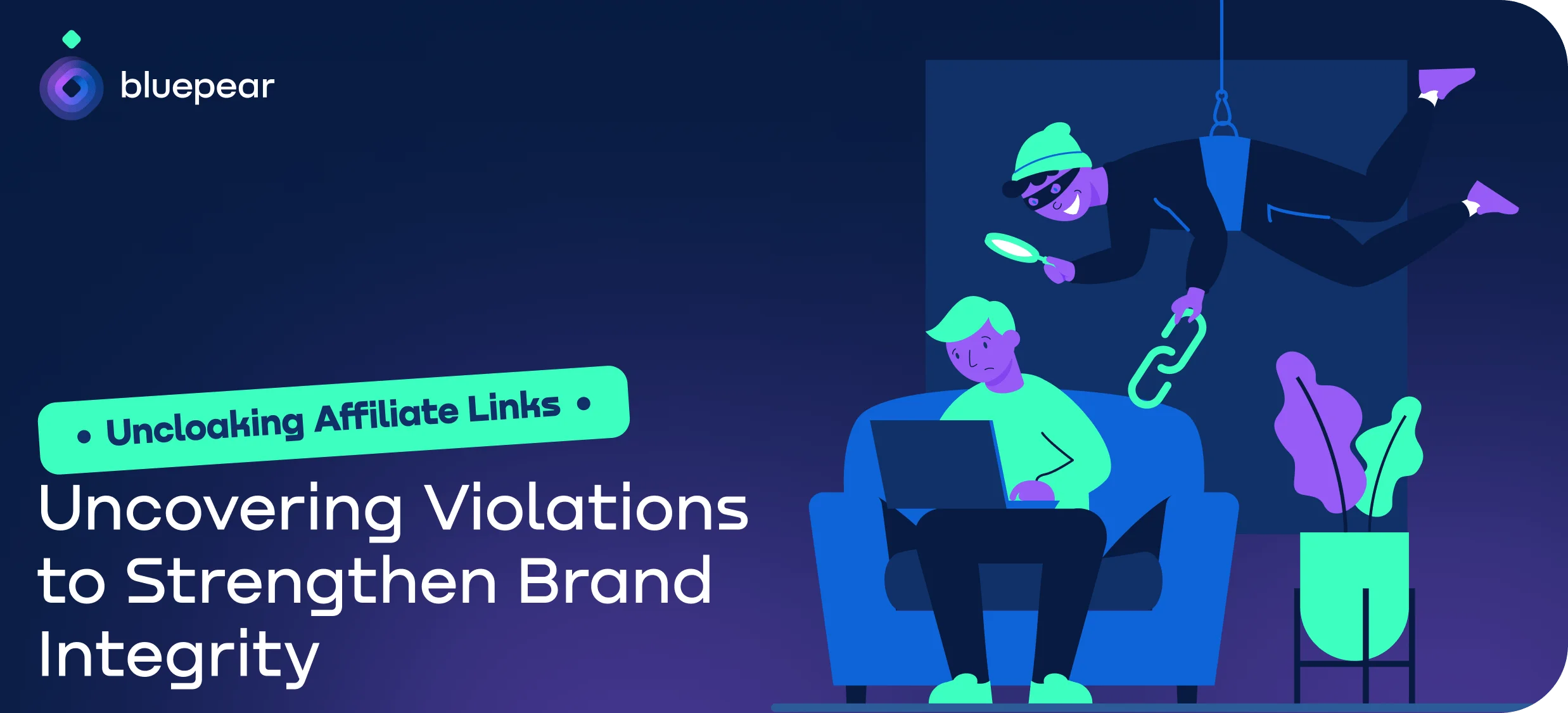
Contents
What is Decloaking?
Before you can understand decloaking, you need to know what masking is and why some affiliates use it. In order to keep users from figuring out which page they are on, cloaking is used to hide where an ad link really goes. When affiliates change URLs, they can add JavaScript and other scripts or change characters (for example, by changing spaces with dashes) or add characters that take users to a different page when they click on an affiliate link.
Another strategy in this category is landing page hiding, which is often associated with illegal SEO methods. Search engine bots will see one set of content, while human users will see completely different content. Under these conditions, the goal is to trick search engines, change rankings, and get an unfair edge. People think that landing page hiding is against search engine rules because it tries to trick both users and search engines.
Claiming methods are used by some SEO and PPC affiliates to hide the brands they work with on the content of their landing pages. The reason? Often, the content on these pages may breach the affiliate program’s guidelines, which could result in penalties or loss of commissions. By cloaking, affiliates try to avoid detection and circumvent the rules.
To combat this, decloaking techniques are used to reveal the hidden content of affiliate links and prevent affiliates from concealing rule-violating material. Uncloaking can be challenging when done manually due to the complexity of the cloaking methods. Automated monitoring tools are critical in detecting these deceptive practices efficiently.
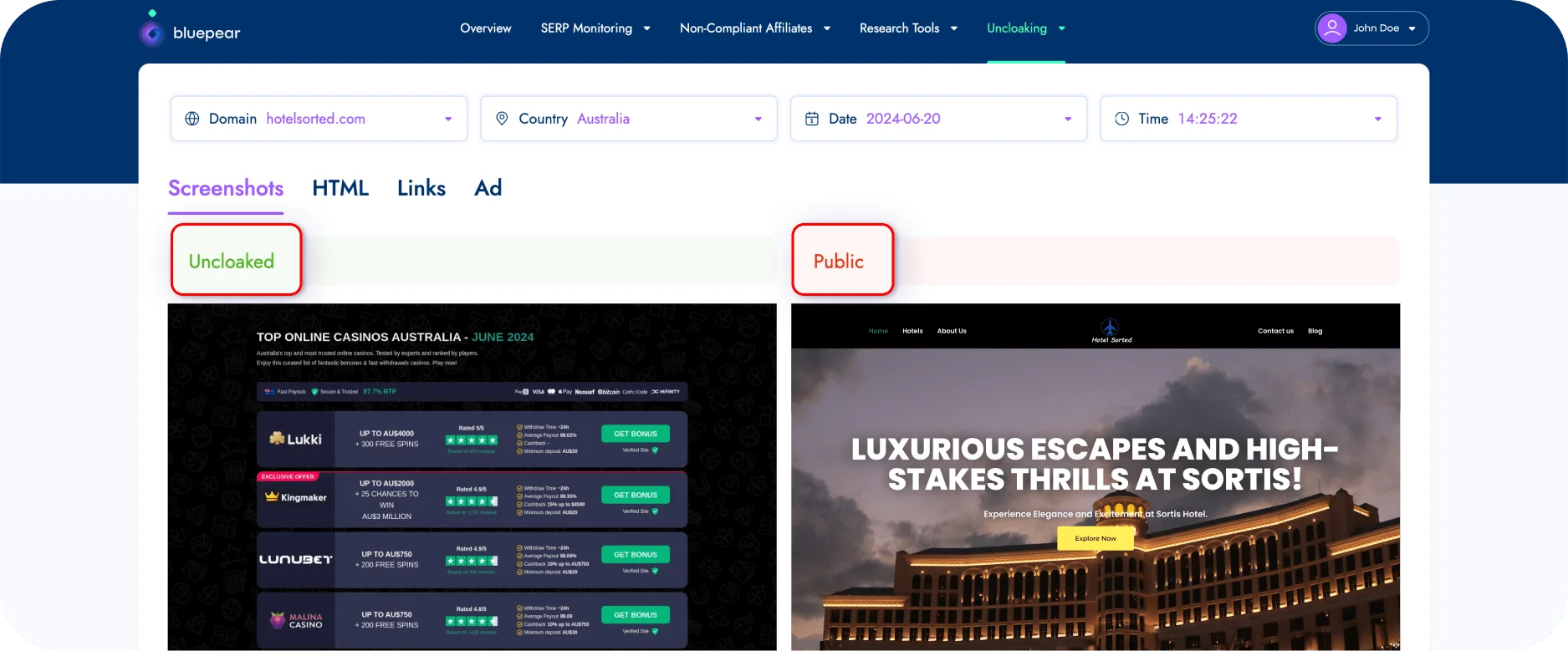
At BluePear, we’ve developed a powerful decloaking tool that simulates real traffic from various countries and devices using thousands of unique IP addresses. This tool enables brands to fully decloak affiliate landing pages, helping them uncover dishonest affiliates who violate program terms.
Is Cloaking Affiliate Links Always Harmful?
Cloaking, when used appropriately, is not inherently negative; it is often employed in affiliate marketing to restrict direct access to the source of a link. Affiliate marketers frequently apply link cloaking techniques to hide the source of their affiliate links, creating the impression that a third-party site or offer is seamlessly incorporated within their own content. However, the intent behind this practice can vary significantly.
For example, affiliates may hide the real destination of their links when they want their visitors to perceive an external offer as part of their own website. This can help prevent users from leaving the page, thereby boosting conversion rates. Additionally, cloaking can help affiliates avoid search engine penalties related to having too many ads, which can impact SEO rankings.
Despite these motivations, cloaking is frequently used by some affiliates to conceal content that violates the terms of their affiliate program agreements. Affiliates may attempt to cloak affiliate links specifically to hide practices that could result in penalties, such as promoting restricted or misleading content. While there are several techniques available for cloaking, not all methods are acceptable, and misuse can lead to severe consequences if uncovered.
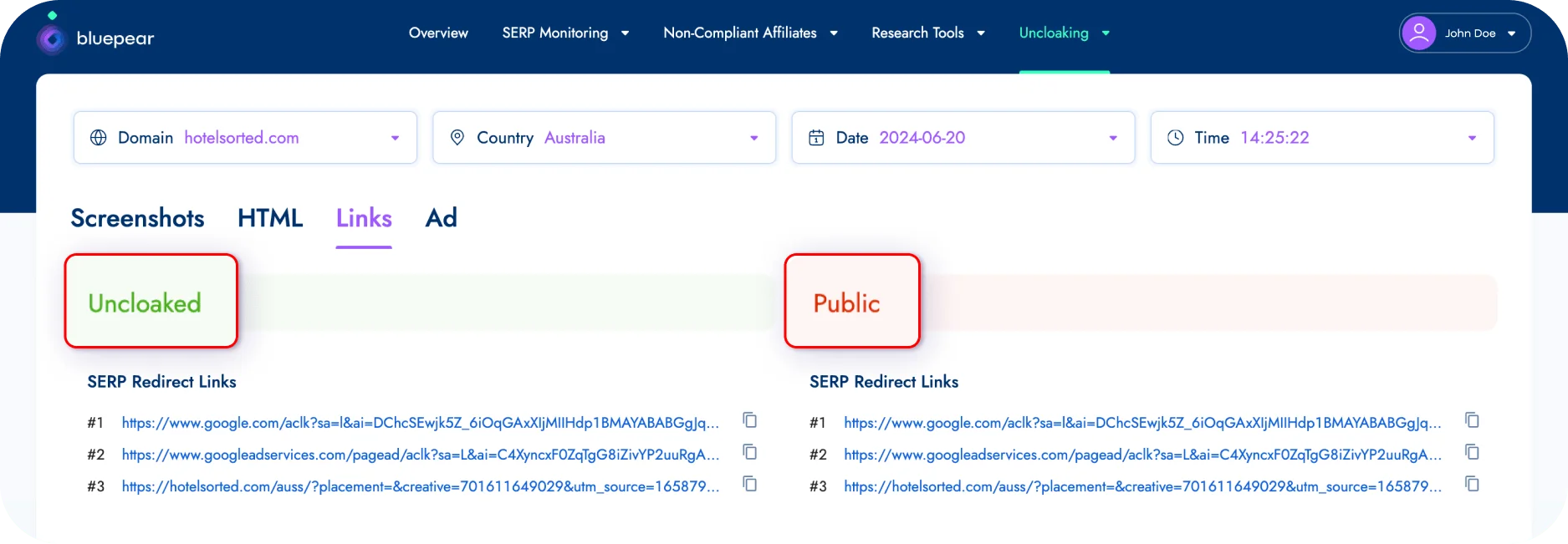
Given the wide range of cloaking strategies, it is crucial for affiliate programs to deploy automated affiliate monitoring tools to detect suspicious behavior. This is why affiliate decloaking has become an essential practice for advertisers seeking to maintain program integrity and ensure that affiliates comply with the terms.
When Do Affiliates Cloak Their Links?
There are various situations where affiliates may choose to cloak affiliate links in order to control how their links appear or to hide certain details. Here are a few common scenarios:
- • Hidden links in blog content: Affiliates may hide affiliate links within blog posts, making them visible only after the user interacts, such as clicking a “Read More” button. This can keep the post looking cleaner while still including the link.
- • Affiliate codes in digital content: When adding links in digital formats like e-books or white papers, affiliates sometimes cloak affiliate links to ensure that affiliate codes are not displayed in plain text. This can help prevent direct copying or misattribution.
- • Pending links on social media: In cases where affiliates create posts with links that need approval from social media platforms, like Facebook or Twitter, they might cloak affiliate links to prevent them from being accessed before the official release. This keeps the links invisible until they’re approved and ready to be shared with the audience.
These are just a few of the ways affiliates can cloak their links for specific purposes, but the risk arises when cloaking is used to hide affiliate links and obscure non-compliant content. For affiliate programs, automated affiliate decloaking tools are essential to identify and monitor these types of cloaking practices effectively.
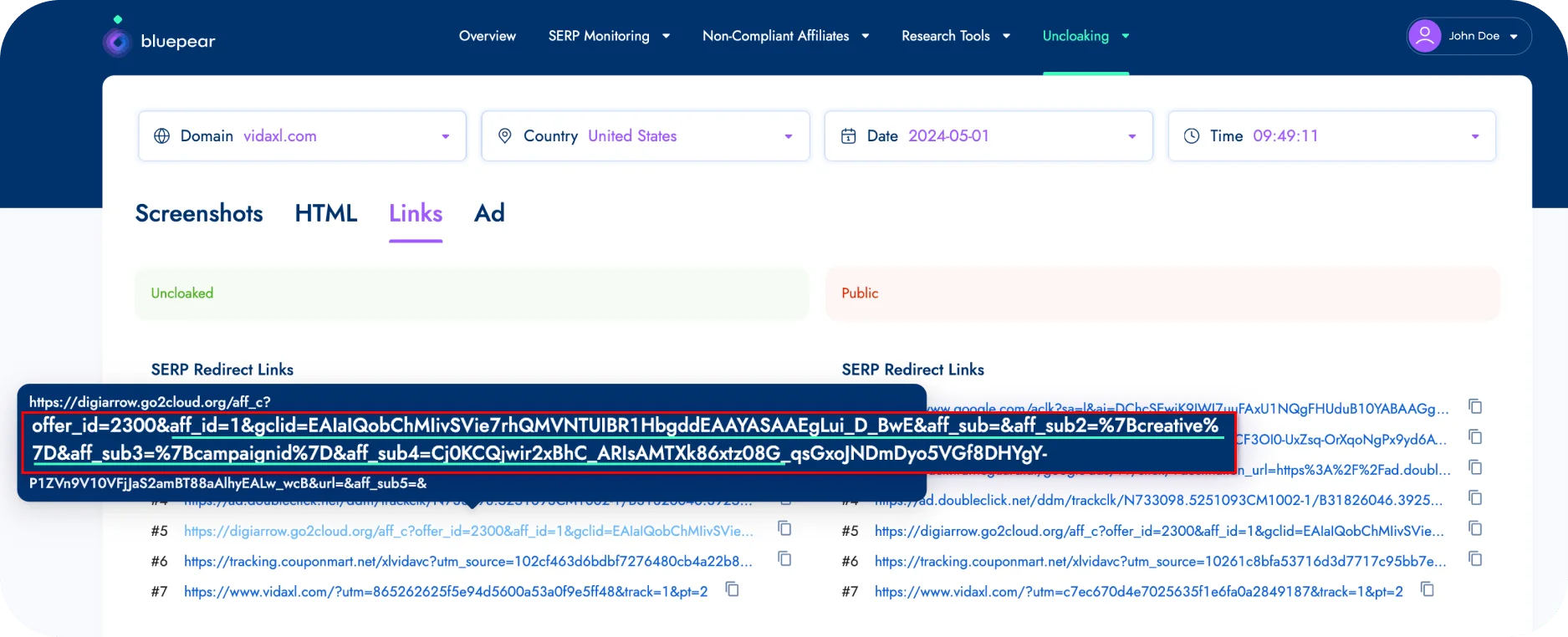
Why Decloaking is Essential for Transparency and Trust
To promote transparency and foster trust with both affiliate programs and audiences, it’s crucial to decloak affiliate links whenever possible. By making your links visible and transparent, you build a stronger connection with your audience, which often translates to higher engagement and more conversions.
In the past, affiliates would often cloak affiliate links to obscure their identity from customers or readers. While cloaking was once considered a common tactic, it has since become a controversial practice due to its deceptive nature. Affiliates today are expected to find more transparent ways of promoting products or services without resorting to cloaking methods that hide affiliate links.
Decloaking is a straightforward approach to enhancing credibility with your audience, which can result in improved click-through rates (CTR) and ultimately boost conversions. For affiliate programs, affiliate decloaking tools are an essential part of a monitoring strategy, helping to identify and address cloaked links that could otherwise damage trust and violate program policies.
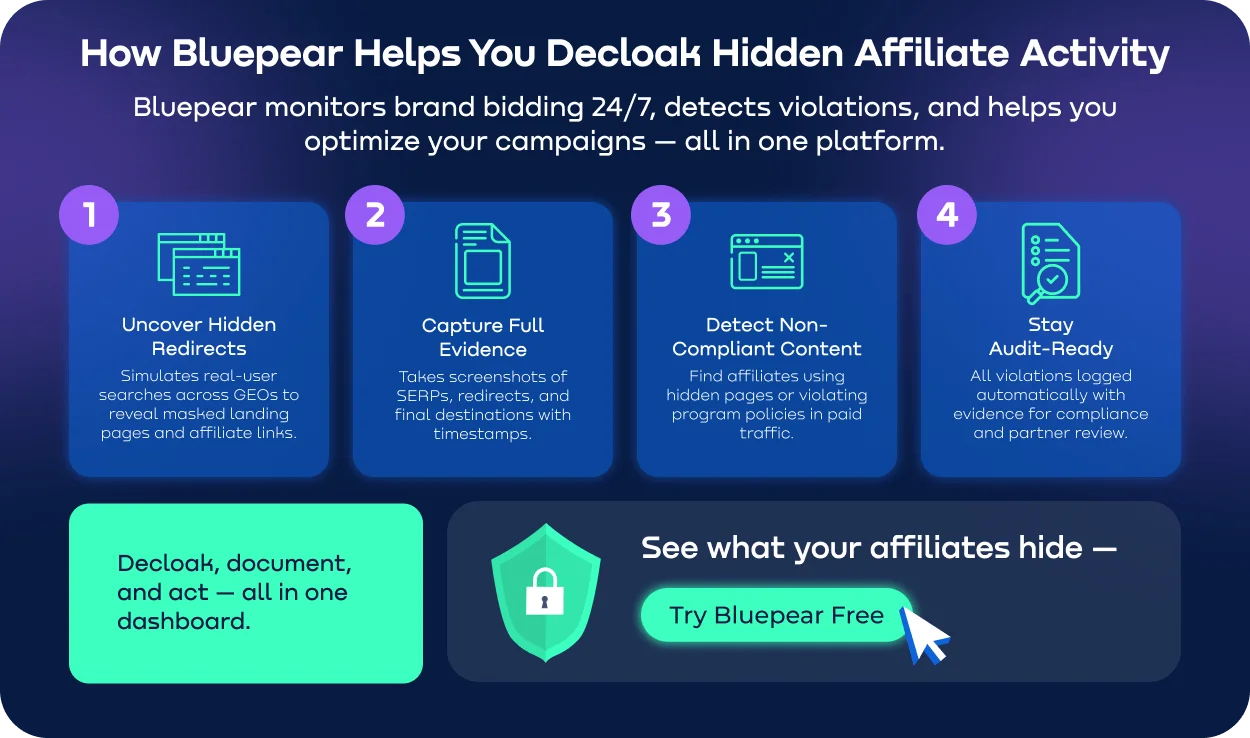
Why Should Affiliates Decloak Their Links?
For affiliates aiming to boost their income and establish credibility, it’s essential to decloak affiliate links. By doing so, affiliates create a transparent experience for users, which builds trust and can lead to better engagement and higher conversion rates. Here are the primary reasons to decloak links before posting them:
- • Enhancing transparency: When you decloak affiliate links, you make it clear where the link leads, fostering a more open relationship with your audience.
- • Building trust: Affiliate decloaking signals to your audience that you have nothing to hide, which helps in building trust—a critical factor for encouraging repeat engagement and conversions.
- • Improving click-through rates: Links that aren’t hidden are often more likely to be clicked. By removing cloaking, affiliates make their links more accessible, which can lead to increased clicks and higher conversions.
Decloaking ultimately benefits affiliates by aligning their practices with user expectations, increasing transparency, and reinforcing trust. For advertisers, using affiliate decloaking tools ensures that affiliates adhere to program policies, allowing them to effectively monitor and brand protection.
How to Decloak Affiliate Links for Free
There are several ways to decloak affiliate links without spending a dime. Whether you choose to use a plugin, a free online tool, or attempt manual methods, each approach has its own benefits.
- 1. Using plugins: For those looking for a quick and straightforward solution, plugins like WordPress tools can automatically decloak affiliate links. This method is popular because it saves time and effort, as the plugin handles the work for you. However, keep in mind that plugins may not be compatible with all link types, particularly custom domains.
- 2. Free tools and services: A range of free tools is available to help you decloak affiliate links by identifying the destination URL. Many of these tools work effectively for standard link structures, but advanced features such as geo-tracking and email tracking may not be supported without premium options.
- 3. Manual decloaking: While manually uncovering cloaked links is possible, it can be quite time-consuming and requires some technical knowledge. Additionally, manual methods may not always be effective against more sophisticated cloaking techniques, particularly those designed to evade detection.
For large-scale affiliate programs, using automated affiliate decloaking tools is often the best option, as they provide consistent results and offer comprehensive monitoring capabilities, essential for tracking potentially deceptive cloaking practices.
Final Thoughts
In summary, understanding affiliate decloaking and the role it plays in affiliate marketing is crucial for maintaining transparency and program integrity. This article has provided an overview of why decloaking is essential, particularly when dealing with affiliates who use cloaking to hide potentially non-compliant practices. By implementing the practical tips we’ve covered, you can effectively decloak affiliate links and gain clearer insights into your affiliates’ activities. Even if you’re not a technical expert, using the right tools and methods can make affiliate decloaking accessible, enabling you to better monitor your program and ensure compliance. For advertisers, automated affiliate decloaking solutions are invaluable for identifying and managing potentially deceptive links, ultimately protecting your brand and helping you foster trust.

